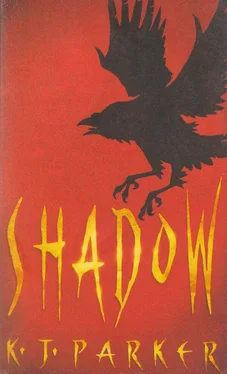K Parker - Shadow
Здесь есть возможность читать онлайн «K Parker - Shadow» весь текст электронной книги совершенно бесплатно (целиком полную версию без сокращений). В некоторых случаях можно слушать аудио, скачать через торрент в формате fb2 и присутствует краткое содержание. Жанр: Фэнтези, на английском языке. Описание произведения, (предисловие) а так же отзывы посетителей доступны на портале библиотеки ЛибКат.
- Название:Shadow
- Автор:
- Жанр:
- Год:неизвестен
- ISBN:нет данных
- Рейтинг книги:3 / 5. Голосов: 1
-
Избранное:Добавить в избранное
- Отзывы:
-
Ваша оценка:
- 60
- 1
- 2
- 3
- 4
- 5
Shadow: краткое содержание, описание и аннотация
Предлагаем к чтению аннотацию, описание, краткое содержание или предисловие (зависит от того, что написал сам автор книги «Shadow»). Если вы не нашли необходимую информацию о книге — напишите в комментариях, мы постараемся отыскать её.
Shadow — читать онлайн бесплатно полную книгу (весь текст) целиком
Ниже представлен текст книги, разбитый по страницам. Система сохранения места последней прочитанной страницы, позволяет с удобством читать онлайн бесплатно книгу «Shadow», без необходимости каждый раз заново искать на чём Вы остановились. Поставьте закладку, и сможете в любой момент перейти на страницу, на которой закончили чтение.
Интервал:
Закладка:
'Anything's possible,' Poldarn replied, 'apparently.'
Sitrych gave him a strange look, part concern and part amusement, as if he'd encountered a two-headed mouse. 'Well,' he said, 'best of luck with it. Watch out, it's sharp.'
'Poldarn wasn't sure whether that was some ancient customary joke or well-meaning advice to a presumed idiot. 'Thanks,' he said, 'I'll be careful with it. Don't want to do anybody an injury.'
Sitrych frowned, shook his head and walked away. The raiders were doing something, though it wasn't immediately apparent what it was; they were falling into groups-not hurrying so you'd notice, but in a few minutes they'd all found their places and formed ranks and files-and they were all looking up at the ridge, preparing their minds. They stopped talking without anybody telling them to; in fact, Poldarn realised, he hadn't heard anybody give any orders, and he had no idea who their leader was, assuming they had one.
Then they started to move. It wasn't walking or running; they seemed to flow, like an incoming wave on the beach that's lapping round your ankles before you realise, and by the time Poldarn had figured out what was going on, they were over the ridge and vanishing out of sight. 'Come on,' someone said cheerfully behind him-not someone he'd spoken to-and he felt a broad hand in the small of his back pushing him forward. Whoever it was didn't seem to be running, but Poldarn had to run to keep up with him.
Over the ridge; and he saw Deymeson in the valley below, the gate in the invisible wall and the town rearing up out of the plain like a shying horse. The rest of the raiders were definitely running now, with the gradient to help them; they were covering the ground ridiculously fast, moving easily and gracefully, like deer. Not running away, Poldarn thought, running toward; here were people who knew exactly what they were doing and why. He wondered what that must feel like.
The man who'd encouraged him over the ridge was right behind his shoulder, keeping perfect pace with him, unobtrusively deliberate on the extreme edge of his circle. There was no possibility whatsoever of getting away, he was committed to these people and their course of action; they'd swallowed him up and absorbed him as easily as the incoming tide absorbs a rockpool. That was disconcerting; right up to the moment when they'd cleared the ridge he'd been reassuring himself that as soon as an opportunity presented itself he'd sneak away and warn the monks-his people-and help them fight, as he was morally obliged to do (after all, these were the raiders he'd heard so much about, the common enemy, the forces of evil). But something had happened, so subtle that he hadn't noticed it happening, and now that was out of the question. He was committed, he'd already taken sides (without knowing it, apparently) and here he was, part of the unstoppable onset of darkness (Except that, if he allowed his concentration to slip for a moment, he could already see himself thinking of these people as his friends, his people, his own; it was as if he'd slotted into place, suddenly and in the dark, or as if he'd been wandering in circles in a blinding fog on the moors and finally stumbled on a house, and only discovered when he pushed the door open that it was his own.)
Academic, in any case, since even if he managed to outrun the man behind him and the rest of the raiders, all of whom were faster than he was, and got to the abbey gates and raised the alarm, it'd only be a matter of moments before the raiders caught up with him, and what could the sword-monks do to save themselves in that time? Besides, if he had enough time to achieve anything he wouldn't spend it warning the abbot, he'd waste it looking for Copis (waste it, because he was sure she was dead, or too heavily guarded to be rescued).
There was nothing he could do for the monks. Unless they could outfight the raiders, they were already dead. In fact, he could see them now, their bodies draped and dumped and piled and dropped in the streets and over and behind walls, under tables and beds where they'd tried to hide, heaped up in stairwells or at the foot of towers they'd fallen or been pushed from. He could see the dust and dirt forming a skin over pools of their blood, the caked and clotted blood masking the tremendous backsabre cuts, from the side of the neck to the middle of the chest; quite vividly, like a man recalling some traumatic memory, he saw them, most dead, a few still dying, painfully dragging breath into punctured lungs, dribbling blood from their mouths like old men or children trying to drink soup. He saw Torcuat, the monk who'd arrested him when he tried to run, lying on his back on the dorter steps, his head lolling at an impossible angle to his shoulders, his eyes wide open. He saw the abbot himself, only just visible under a pile of arms and legs and trunks and heads, all haphazard and confused, like the scrap in Sansory market; a cut had split his face on a diagonal running from the right eye socket to the left corner of his mouth, though the stroke that killed him had been a stab just under the ribcage, with the palm-wide point of a backsabre. He saw Copis, still alive, one leg severed at the knee, her back broken over the side of a cart That'd be right, he thought; I can't remember the past, only the future.
The raiders were at the invisible wall already. The guard at the gatehouse took one look at them and ran, but the foremost raider caught up with him before he reached the bottom of the hill, grabbed him by the left shoulder, spun him round and ripped him open with a short, quick flick of the wrist. As usual, the street leading up the hill was empty; the raider who'd just killed the guard didn't stop or even break stride, but started to run up the hill, hardly slowing down in spite of the gradient. Meanwhile, five other columns of raiders had appeared out of nowhere and were streaming across the open ground; Poldarn was sure there were others that he couldn't see, approaching the hill from the north, west and east. He could almost see them, or at least he remembered seeing them pouring into the abbey courtyard, like floodwater overwhelming a house. At some point he'd quickened his pace so that he was almost keeping up. It hadn't been a conscious decision, but he found he didn't feel tired or short of breath, it was as if he was drawing on a shared strength that came from the others all around him. He saw Sitrych, the man who'd lent him the sword, dodging round the side of the gatehouse and lengthening his stride as he approached the hill, and another man he'd spoken to on the way there-Engfar, his name was-only a pace or two behind him, and gaining. If he'd had the breath, he'd have been tempted to cheer them on, as if he had money on the outcome.
By the time he reached the bottom of the hill he could just hear the sound of something going on at the top over the pounding of his own heart. He kept running, without knowing how; he was a boat on the back of a big wave, arching its back like a cat before jumping on its prey. At one point he had to jump over the dead body of a monk to keep himself from tripping and sprawling. Someone was screaming somewhere, but he had no way of knowing what it was about.
The next monk he met was definitely still on his feet, a lay brother who stepped out of a house a yard or so in front of him holding a short pike. Yesterday he'd have stopped and taken guard, knowing how difficult it is for a swordsman to get the better of a spearman in a one-to-one fight. Today he swerved round him, slashing wildly as he went past to ward off any thrust the man might make-no intention of killing anybody, just defence. He didn't feel any shock of contact run up his arm from the sword blade, and he didn't have time to look round. The lay brother was dead anyway, he'd already seen it, so there didn't seem to be much point.
Читать дальшеИнтервал:
Закладка:
Похожие книги на «Shadow»
Представляем Вашему вниманию похожие книги на «Shadow» списком для выбора. Мы отобрали схожую по названию и смыслу литературу в надежде предоставить читателям больше вариантов отыскать новые, интересные, ещё непрочитанные произведения.
Обсуждение, отзывы о книге «Shadow» и просто собственные мнения читателей. Оставьте ваши комментарии, напишите, что Вы думаете о произведении, его смысле или главных героях. Укажите что конкретно понравилось, а что нет, и почему Вы так считаете.












